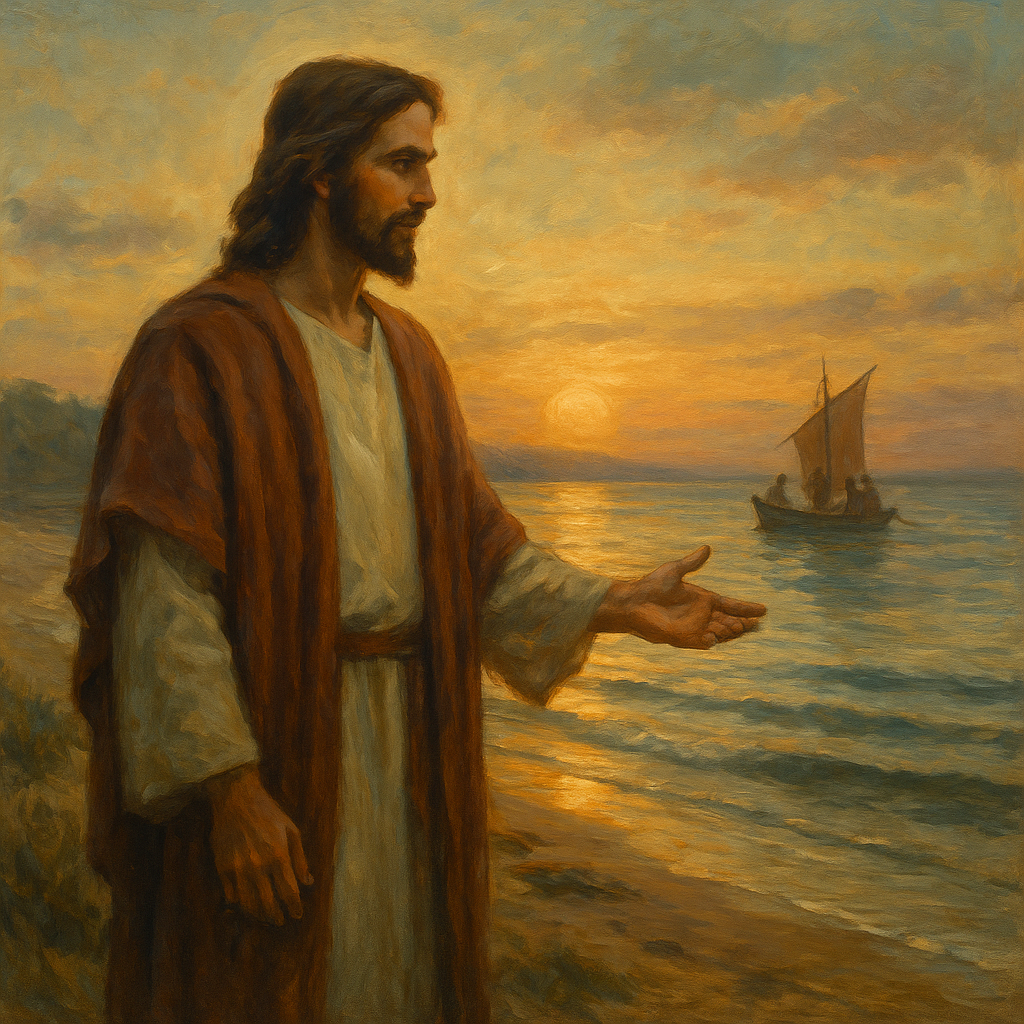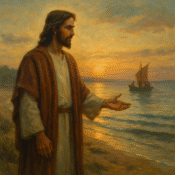
May These Shores Be With Us: Where Christ Meets Us Today
On May 4th, the Third Sunday of Easter, Rev. Katherine Lee Baker brought us to the shoreline—not just of Galilee, but of our own hearts. Her sermon, “May These Shores Be With Us,” invited us to imagine the risen Christ not in distant glory but close at hand: standing at the edge of our routines, calling to us as we are.
This reflection extends that invitation. What does it mean to meet God at the shoreline of our lives? And what happens when we dare to answer the call?
1. The Shoreline as Sacred Threshold
In John 21, the disciples return to something familiar: fishing. After the trauma and confusion of the crucifixion, they do what we all do when life turns upside down—they go back to what they know. It’s there, in that ordinary moment, that Jesus appears again.
This is the radical grace of resurrection: Christ doesn’t wait for us to “get it together.” He meets us in exhaustion, ambiguity, and even disappointment. The shoreline becomes a threshold between despair and hope, between isolation and encounter.
Reflection: Where in your own life are you standing at the edge? Perhaps you’re not sure what comes next. The invitation isn’t to figure it all out, but simply to listen—to recognize that Christ is already cooking breakfast on the shore, calling your name.
2. Feeding and Being Fed
“Come and have breakfast,” Jesus says. It’s not a flashy miracle. It’s a meal. A fire. Bread and fish. The disciples are not asked to perform or prove anything—they are simply invited to receive.
And yet, after feeding them, Jesus gives Peter a commission: “Feed my sheep.” Grace flows both ways—into us and through us. Being nourished by God is not a passive experience; it empowers us to nourish others.
Personal Application: If you’re feeling burned out, ask yourself: when was the last time you allowed yourself to be spiritually fed without needing to perform, plan, or produce? And when you are filled—how can you share that with someone else?
3. Calling Again and Again
Jesus doesn’t ask Peter, “Why did you deny me?” He doesn’t bring shame. He asks, three times, “Do you love me?” And then He sends him out again. It is an echo of Peter’s first call, but with deeper weight—because it comes after failure and forgiveness.
This is the nature of divine calling: it doesn’t expire when we fall short. In fact, our second callings are often more profound, because they come with greater humility, depth, and grace.
Insight: Don’t believe the lie that you’ve disqualified yourself from your calling. God’s call isn’t revoked—it’s renewed. Peter’s story shows us that God uses people who have known regret as much as revelation.
4. Saul, Disrupted by Grace
From the shoreline to the road, the lectionary’s second text in Acts 9 reveals Saul’s conversion. It is abrupt, blinding, and terrifying. But it is also grace. Saul, a man driven by zealous certainty, is stopped—so that he might see differently.
Where Peter was gently restored, Saul is dramatically interrupted. Both are acts of love.
Challenge: Are there areas in your life where you’re running on autopilot—or worse, on self-righteous certainty? God’s grace might disrupt before it comforts. Can you be open to that interruption?
5. Resurrection Isn’t Over
Perhaps the most powerful takeaway from this message is this: Easter is not a day—it’s a season. And more than that, it’s a way of living. Resurrection didn’t end at the empty tomb. It continued on the shore, on the road to Damascus, and in the lives of those who answered the call.
Takeaway: Look for resurrection not just in church services or mountaintop experiences, but in quiet mornings, difficult conversations, second chances, and unexpected kindness. The risen Christ walks there, too.
Final Thought
Marie Post’s poem “Galilee Outing” speaks of “the widening space between our usual mooring and our small skiff.” Maybe that’s where you are—adrift between the old and the new, unsure of what God is doing next.
Good.
Because it’s in that space—the shoreline—that resurrection becomes real.
Christ is not waiting for you to be perfect. He’s building a fire. He’s calling your name. He’s saying, “Come eat,” and then, “Feed others.” He’s disrupting what’s harmful and resurrecting what’s holy.
So may these shores be with you this week. May you recognize the Christ who stands in the ordinary and calls you—again and again—to love, serve, and live.
Written in reflection on the May 4, 2025 worship service at Bostwick Lake Congregational UCC. Sermon by Rev. Katherine Lee Baker.
Recent Reflections
Newsletter
Stay updated on events, announcements, and news with our e-newsletter—delivered straight to your inbox!




